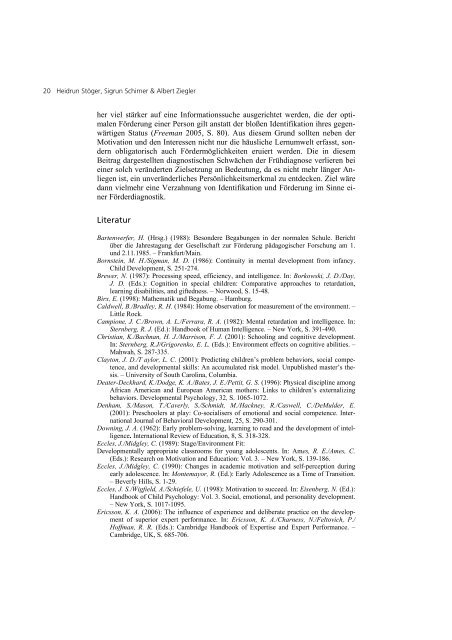Ist die Identifikation Begabter schon im Vorschulalter möglich? Ein ...
Ist die Identifikation Begabter schon im Vorschulalter möglich? Ein ...
Ist die Identifikation Begabter schon im Vorschulalter möglich? Ein ...
Sie wollen auch ein ePaper? Erhöhen Sie die Reichweite Ihrer Titel.
YUMPU macht aus Druck-PDFs automatisch weboptimierte ePaper, die Google liebt.
20 Heidrun Stöger, Sigrun Schirner & Albert Ziegler<br />
her viel stärker auf eine Informationssuche ausgerichtet werden, <strong>die</strong> der opt<strong>im</strong>alen<br />
Förderung einer Person gilt anstatt der bloßen <strong>Identifikation</strong> ihres gegenwärtigen<br />
Status (Freeman 2005, S. 80). Aus <strong>die</strong>sem Grund sollten neben der<br />
Motivation und den Interessen nicht nur <strong>die</strong> häusliche Lernumwelt erfasst, sondern<br />
obligatorisch auch Förder<strong>möglich</strong>keiten eruiert werden. Die in <strong>die</strong>sem<br />
Beitrag dargestellten diagnostischen Schwächen der Frühdiagnose verlieren bei<br />
einer solch veränderten Zielsetzung an Bedeutung, da es nicht mehr länger Anliegen<br />
ist, ein unveränderliches Persönlichkeitsmerkmal zu entdecken. Ziel wäre<br />
dann vielmehr eine Verzahnung von <strong>Identifikation</strong> und Förderung <strong>im</strong> Sinne einer<br />
Förderdiagnostik.<br />
Literatur<br />
Bartenwerfer, H. (Hrsg.) (1988): Besondere Begabungen in der normalen Schule. Bericht<br />
über <strong>die</strong> Jahrestagung der Gesellschaft zur Förderung pädagogischer Forschung am 1.<br />
und 2.11.1985. – Frankfurt/Main.<br />
Bornstein, M. H./Sigman, M. D. (1986): Continuity in mental development from infancy.<br />
Child Development, S. 251-274.<br />
Brewer, N. (1987): Processing speed, efficiency, and intelligence. In: Borkowski, J. D./Day,<br />
J. D. (Eds.): Cognition in special children: Comparative approaches to retardation,<br />
learning disabilities, and giftedness. – Norwood, S. 15-48.<br />
Birx, E. (1998): Mathematik und Begabung. – Hamburg.<br />
Caldwell, B./Bradley, R. H. (1984): Home observation for measurement of the environment. –<br />
Little Rock.<br />
Campione, J. C./Brown, A. L./Ferrara, R. A. (1982): Mental retardation and intelligence. In:<br />
Sternberg, R. J. (Ed.): Handbook of Human Intelligence. – New York, S. 391-490.<br />
Christian, K./Bachnan, H. J./Marrison, F. J. (2001): Schooling and cognitive development.<br />
In: Sternberg, R.J/Grigorenko, E. L. (Eds.): Environment effects on cognitive abilities. –<br />
Mahwah, S. 287-335.<br />
Clayton, J. D./T aylor, L. C. (2001): Predicting children’s problem behaviors, social competence,<br />
and developmental skills: An accumulated risk model. Unpublished master’s thesis.<br />
– University of South Carolina, Columbia.<br />
Deater-Deckhard, K./Dodge, K. A./Bates, J. E./Pettit, G. S. (1996): Physical discipline among<br />
African American and European American mothers: Links to children’s externalizing<br />
behaviors. Developmental Psychology, 32, S. 1065-1072.<br />
Denham, S./Mason, T./Caverly, S./Schmidt, M./Hackney, R./Caswell, C./DeMulder, E.<br />
(2001): Preschoolers at play: Co-socialisers of emotional and social competence. International<br />
Journal of Behavioral Development, 25, S. 290-301.<br />
Downing, J. A. (1962): Early problem-solving, learning to read and the development of intelligence.<br />
International Review of Education, 8, S. 318-328.<br />
Eccles, J./Midgley, C. (1989): Stage/Environment Fit:<br />
Developmentally appropriate classrooms for young adolescents. In: Ames, R. E./Ames, C.<br />
(Eds.): Research on Motivation and Education: Vol. 3. – New York, S. 139-186.<br />
Eccles, J./Midgley, C. (1990): Changes in academic motivation and self-perception during<br />
early adolescence. In: Montemayor, R. (Ed.): Early Adolescence as a T<strong>im</strong>e of Transition.<br />
– Beverly Hills, S. 1-29.<br />
Eccles, J. S./Wigfield, A./Schiefele, U. (1998): Motivation to succeed. In: Eisenberg, N. (Ed.):<br />
Handbook of Child Psychology: Vol. 3. Social, emotional, and personality development.<br />
– New York, S. 1017-1095.<br />
Ericsson, K. A. (2006): The influence of experience and deliberate practice on the development<br />
of superior expert performance. In: Ericsson, K. A./Charness, N./Feltovich, P./<br />
Hoffman, R. R. (Eds.): Cambridge Handbook of Expertise and Expert Performance. –<br />
Cambridge, UK, S. 685-706.


